

Online MBSR (free) Online Mindfulness-Based Stress Reduction (MBSR) This online MBSR training course is 100% free, created by a fully certified MBSR instructor, and is modeled on the program founded by Jon Kabat-Zinn at the University of Massachusetts Medical School.
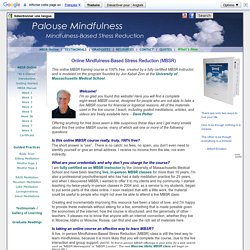
Feeling Overwhelmed? Remember the "RAIN" mindfulness practice. Four steps to stop being so hard on ourselves.
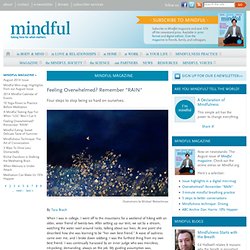
Illustrations by Michael Woloschinow By Tara Brach When I was in college, I went off to the mountains for a weekend of hiking with an older, wiser friend of twenty-two. After setting up our tent, we sat by a stream, watching the water swirl around rocks, talking about our lives. At one point she described how she was learning to be “her own best friend.”
Over the last several decades, through my work with tens of thousands of clients and meditation students, I’ve come to see the pain of perceived deficiency as epidemic. Excel At Life Mobile. 101 Reasons to be Mindful. 1.
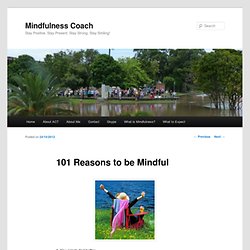
You simply feel better. 2. You experience life more fully. 3. You experience other people more fully. Mindful Eating. This is a great blog from Chris, who can be found on Twitter as @mindfulness_man.
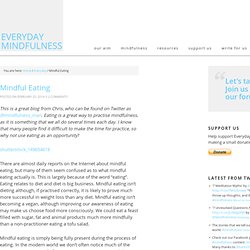
Eating is a great way to practise mindfulness, as it is something that we all do several times each day. I know that many people find it difficult to make the time for practice, so why not use eating as an opportunity? Infographic: What Good Is Gratitude? "Count your blessings and you will have an attitude of gratitude.
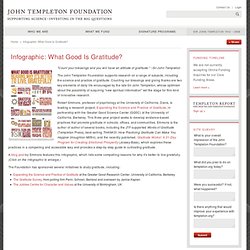
" ~Sir John Templeton The John Templeton Foundation supports research on a range of subjects, including the science and practice of gratitude. Counting our blessings and giving thanks are two key elements of daily life encouraged by the late Sir John Templeton, whose optimism about the possibility of acquiring “new spiritual information" set the stage for this kind of innovative research. Robert Emmons, professor of psychology at the University of California, Davis, is leading a research project, Expanding the Science and Practice of Gratitude, in partnership with the Greater Good Science Center (GGSC) at the University of California, Berkeley. This three-year project seeks to develop evidence-based practices that promote gratitude in schools, offices, and communities. Mindfulness. What Mindfulness Is.
Now that meditation has hit the cover of Time, the Wisdom 2.0 conference has brought meditating executives to the headlines, and figures from Arianna Huffington to 50 Cent do the practice, a bit of backlash was inevitable.
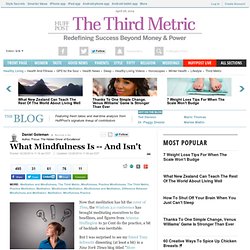
But I was surprised to see my friend Tony Schwartz dissenting (at least a bit) in a New York Times blog titled "More Mindfulness, Less Meditation. " Tony's sense of the working world ranks first class, but this time I think he got the facts wrong, in two ways. To be sure, he nods to the well-established benefits of meditation: It lowers levels of the stress hormone cortisol, enhances the immune response, lifts mood, helps us recover more quickly from stress and sharpens focus. Interview With Richard Gilpin. Based in Brighton, UK, Richard Gilpin has trained extensively in mindfulness-based since the 1990s and integrates mindfulness practice in his work as a counsellor and Cognitive Behaviour Psychotherapist.
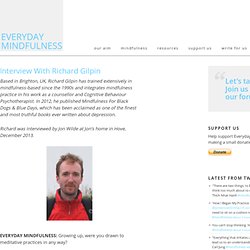
In 2012, he published Mindfulness For Black Dogs & Blue Days, which has been acclaimed as one of the finest and most truthful books ever written about depression. Should Mindfulness Be Taught In Classrooms? By Traci Pedersen Associate News Editor Reviewed by John M. Grohol, Psy.D. on February 15, 2014 The practice of mindfulness has been shown to counteract the heavy toll of anxiety, stress, chronic pain, and illness on the body and mind; and if kids could learn these skills in school, they would be in great shape by the time they were adults, according to Jon Kabat-Zinn, Ph.D., a renowned proponent of applying the practice of mindfulness in schools.
Kabat-Zinn believes that in bringing mindfulness training to K–12 classrooms — what he calls “contemplative education” — students and teachers both will be able to reap the immense physiological benefits. Kabat-Zinn is a professor of medicine emeritus and the founding director of the Stress Reduction Clinic and the Center for Mindfulness in Medicine, Health Care, and Society at the University of Massachusetts Medical School. He recently addressed the Harvard Graduate School of Education on this topic. “Real education never ends. Six Ways To Make Your Day More Mindful. This is a lovely blog from The Mindfulness Project in London about bringing mindfulness into everyday life, the original blog can be found here.
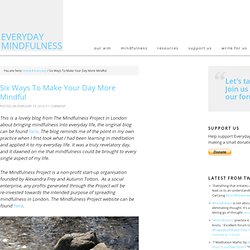
The blog reminds me of the point in my own practice when I first took what I had been learning in meditation and applied it to my everyday life. It was a truly revelatory day, and it dawned on me that mindfulness could be brought to every single aspect of my life. The Mindfulness Project is a non-profit start-up organisation founded by Alexandra Frey and Autumn Totton. As a social enterprise, any profits generated through the Project will be re-invested towards the intended purpose of spreading mindfulness in London. The Mindfulness Project website can be found here.
Think about the last time you had a shower. Or did you furiously lather the shampoo into your hair while planning the meeting you had later on that morning? With mindfulness, we have the chance to really slow down and appreciate everyday activities with new eyes, new senses. 1. Reactive behavior. Focus On Senses To Calm Your Mind. Mindfulness practice can be as simple as reaching out and touching, seeing, smelling or... well, you get the idea.
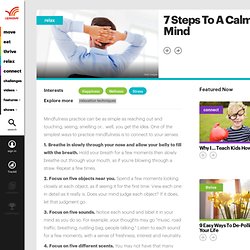
One of the simplest ways to practice mindfulness is to connect to your senses. 1. Breathe in slowly through your nose and allow your belly to fill with the breath. Hold your breath for a few moments then slowly breathe out through your mouth, as if you’re blowing through a straw. Mindful February 2014 Sampler by Stephany Tlalka.
10 Best Practices for Being Present. Andy Puddicombe: All it takes is 10 mindful minutes. Www.mindful.org/sites/default/files/Mindful_freemium.pdf. Make Your Selfies Mindful Instead Of Mindless. 4 Quick Mindfulness Techniques. Image Microforum Italia This is Thanksgiving week … the week some of us are very thankful that we don’t live in the same city as our relatives.
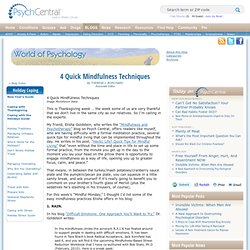
So I’m calling in the experts. My friend, Elisha Goldstein, who writes the “Mindfulness and Psychotherapy” blog on Psych Central, offers readers like myself, who are having difficulty with a formal meditation practice, several quick tips for mindful living that can be implemented throughout the day. He writes in his post, “Hectic Life? Quick Tips for Mindful Living” that “even without the time and place in life to set up some formal practice, from the minute you get up in the day to the moment you lay your head on the pillow there is opportunity to engage mindfulness as a way of life, opening you up to greater focus, calm, and peace.” For this week’s “Mindful Monday,” I thought I’d list some of the easy mindfulness practices Elisha offers in his blog: In his blog “Difficult Emotions: One Approach You’ll Want to Try,” Dr. W.A.I.T. a Minute. Mindfulness: a beginner's guide. Mindfulness: a beginner's guide.
Mindfulness: a beginner's guide. Relax-Mindful-EMDR-CoachingHandout. Mindfulness Stops Negativity From Sticking to You Like Glue. Did you ever get into a heated argument with someone over a meaningless issue, only to find that encounter constantly replaying itself in your head, as if it's stuck to you like glue? You don't want to think of the other person, yet now there's no getting away from them; you're stuck with them. Despite the situation or encounter being well over, it keeps coming up again in your mind.
Soon after Nelson Mandela's release after 27 years in jail, President Bill Clinton asked Mandela if he was angry with his jailors the day he finally walked away them. "Surely," Clinton asked, "You must have felt some anger? " Mandela agreed that, yes, alongside the joy of being free, he also felt great anger. This Is Scientific Proof That Happiness Is A Choice. One theory in psychology research suggests that we all have a happiness "set-point" that largely determines our overall well-being. We oscillate around this set point, becoming happier when something positive happens or the opposite, afterwards returning to equilibrium. But this set-point, to a certain extent, can be reset. Although our general mood levels and well-being are partially determined by factors like genetics and upbringing, roughly 40 percent of our happiness is within our control, according to some experts, and a large body of research in the field of positive psychology has shown that happiness is a choice that anyone can make.
As psychologist William James put it, “The greatest discovery of any generation is that a human can alter his life by altering his attitude. " Here are eight ways you can take control of your own happiness. Simply try. 'Mindful Moments' Program Has High School Students Begin And End Each Day With Meditation. The BRFWA Process. By Valerie Reiss Often in the yoga world, you'll hear directions like, "Let it go," "Relax," "Breathe into it.
" These all sound lovely, but when I'm in a wound-up state, they strike me as abstract, unattainable, and a tad annoying. Let what go, where? Relax? Thanks, I'll get right on that. Mindfulness Meditation for a Stress-Less Mind. We were listening to a radio interview we did recently, talking about the profound benefits of meditation. 'Mindfulness' Meditation Alters Gene Expression, Study Suggests.
It's no secret that mindfulness meditation -- a practice that encourages focusing attention on the present moment -- can ease emotional stress. And evidence is mounting that mindfulness also may have key benefits for your physical health -- from lowering blood pressure to helping curb addiction.